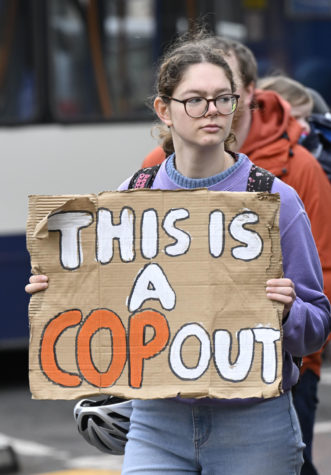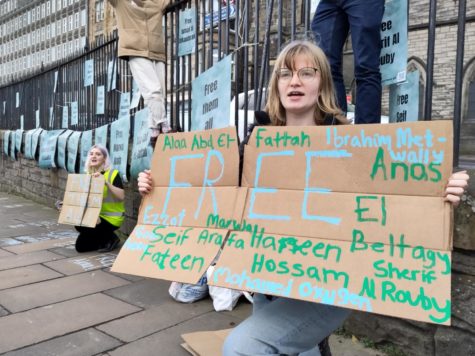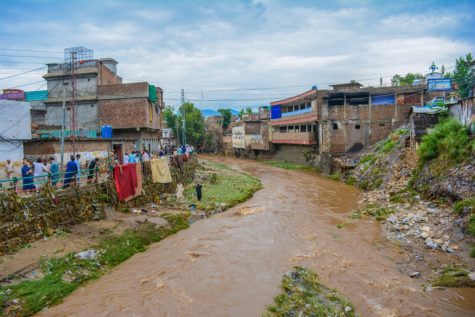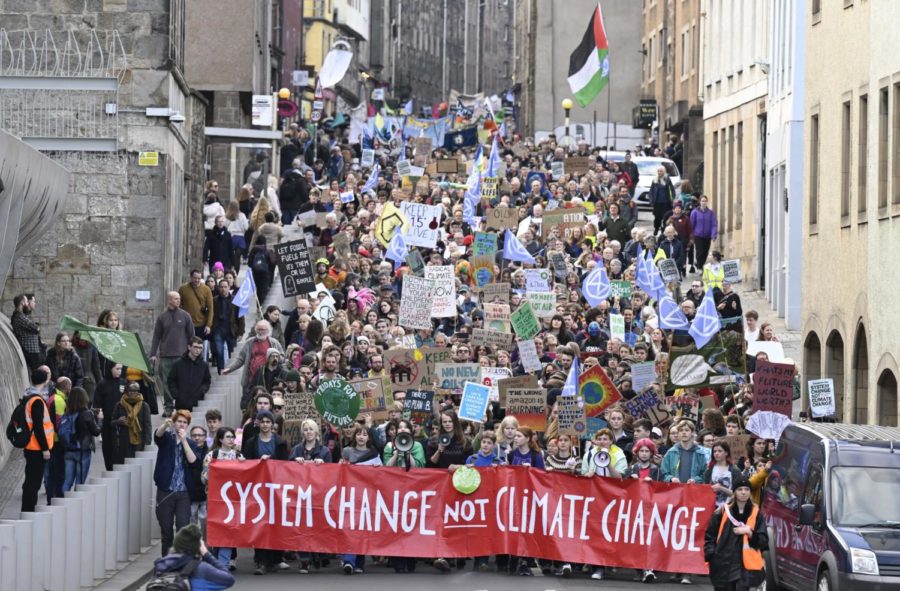The 3 C’s of COP 27: Climate, Corporations, and Crime
The 27th Conference of Parties featured a plethora of controversies — in which climate change was the last focus — from geopolitical tensions to Egypt’s human rights abuses to corporate greenwashing.
Neil Hanna, Friends of the Earth Scotland from Scotland, CC BY 2.0
As world leaders meet halfway across the world at COP 27 in Sharm el-Sheikh, Egypt, climate change activists march through Edinburgh, United Kingdom to mark the Global Day of Action for Climate Justice. Highlighting the urgency of global warming, campaigners demanded that swift action be taken to address the ongoing crisis.
COP 27, one of the world’s most important climate change discussions, took place in Sharm el-Sheikh, Egypt from November 6th to the 18th of 2022. Yet, the issues surrounding the conference overshadowed the focus of the talks. From corporate greenwashing to unfulfilled promises by global superpowers to disputes over the location of the dialogue, COP 27 occurred amidst high suspense.
Few are strangers to the global warming crisis. The horrifying statistics about our planet’s future haunt many worldwide, even our world leaders. It was from this mutual fear of climate crisis that the Conference of the Parties (COP) was born.
In 1992, 197 countries ratified the United Nations Framework Convention on Climate Change to address dangerous human interference with the climate and stabilize levels of greenhouse gasses in the atmosphere. The U.N. climate body convenes once a year at the COP to discuss how to jointly address climate change.
Over the past twenty-seven years, the discussions have led to various international climate change combatting initiatives, including the 2015 Paris Agreement and its predecessor, the 1997 Kyoto Protocol. While the Kyoto Agreement only applied to developed nations, the Paris Agreement expanded on the pact to include nearly all countries worldwide, making considerable progress in the fight against global warming.
However, in recent years, the talks once lauded by activists have become negotiations of juxtapositions, in which countries have put advancement in cutting carbon emissions on the backburner.

Critics have condemned the most recent conference for its greenwashing and hollow promises. Greenwashing is a blanket term to describe false or unproven claims in an institution’s environmental records. At previous COPs, various countries vowed to reduce their carbon emissions but have since reneged on their promises.
“I feel like more should’ve been done to solidify the promises made by the countries around the world, and to promote COP 27. As climate change continues to worsen, this conference needs to be promoted globally so we can really focus on the issues it presents,” said Mathew Emer ’26.
Corporations have faced minimal repercussions for their immense carbon emissions, the most notable being Coca Cola, the soft drink giant that is also the world’s leading polluter of plastics according to a 2021 report. Another report issued by the Ellen MacArthur Foundation, shows that rather than actively combating its climate emissions, Coca-Cola has increased its use of new plastics to 3.2 million tons.
Nearly 240,000 people signed a petition urging the conference to drop the company that makes roughly 4,000 plastic bottles from oil every second as one of its key sponsors. Yet, the collaboration continued in spite of the backlash and went unaddressed at the conferences.
COP 27 has also been criticized for hiring Hill+Knowlton Strategies, a public relations firm that previously represented oil companies such as ExxonMobil, Chevron, Shell, and Saudi Aramco. In fact, in an open letter to the firm, more than 400 scientists wrote that Hill+Knowlton’s work for fossil fuel industry clients is “incompatible” with the aims of the COP 27 negotiations and would thus compromise their integrity.
But the conference’s conflicts stretched farther than just its public relations firm. Even the delegates participating in the negotiations could not communicate with one another. Laura Augenbraun, a junior at the University of Connecticut, had the opportunity to attend the discussion in Sharm el-Sheikh, Egypt. “It felt as though there were two conferences going on,” she said. “The dominant side was led by panels of CEOs of corporations and politicians who made empty promises with no real plan for action.”
Augenbraun participated in the UConn@COP program, aimed at building future leaders in climate science and policy by increasing youth representation at significant global conferences. She and other selected peers attended the entirety of COP 27, gaining great perspective and insight.
A particularly resonant experience for her was witnessing the negotiations between different nations’ representatives. Many parties disagreed over inconsequential wordings in the resolutions to combat climate change.

She recounted, “Instead of actually discussing the impacts of climate change, every country was just stating reasons why they didn’t approve of the document.”
Augenbraun expanded on her frustrations, having sat in a corner of the negotiation room, watching the delegates provide no actual solutions to address climate change. When the allocated discussion time ended, there was still no true consensus. The moderator stated that if further discussion wanted to be made, representatives would have to talk to each other outside of the negotiation room and e-mail the final decision.
When she approached the United States representative after the discussion, Augenbraun asked her if she would actually speak with other officials after COP 27 was over. The delegate’s response was no.
Others who attended the discussions also reported similar experiences. Mr. Bill McKibben, the founder of 350.org, the first global grassroots climate campaign, and Third Act, which organizes people over the age of sixty for climate justice, found COP 27 lacking as well.
“I was not satisfied. I’m glad there’s a general structure for loss and damage compensation [to countries suffering from the effects of climate change], but it still needs to be funded, and there was little attention on pushing nations to move faster to cut carbon.” McKibben said.
But the criticisms of the conference do not just stop there, the location of the talks — an authoritarian regime that jails thousands of perceived political opponents — has also been intensely debated. The 27th Conference of the Parties took place in Sharm el-Sheikh, Egypt, in a country renowned for its human rights abuses. The city may be known as the City of Peace — it has been home to numerous international peace conferences before — but just outside its borders, violence and corruption run rampant.
According to the Committee to Protect Journalists, Egypt has consistently ranked among the world’s top jailers of journalists since President el-Sisi was elected in 2014. Investigations also found inhibitions of free and political speech, including the restriction of the media and violent targeting of LGBTQ+ individuals.
Police and prison guards resort to frequent torture to extract information from detainees, including minors. Reported techniques include beatings, electric shocks, and psychological abuse.
Recently, the country has come under intense scrutiny over the imprisonment of Alaa Abd el-Fattah, a leading pro-democracy activist and Egypt’s highest-profile political prisoner. He has spent the majority of the past decade in prison for sharing social media posts about state-sponsored torture.

Abd el-Fattah has been on hunger strike since April in protest of his detention conditions. He initially consumed 100 calories a day before escalating to a full hunger strike in the week before COP 27 and then ceasing to drink water the day the conference began.
The Egyptian government had hoped that hosting COP 27 would bring positive coverage to Egypt and legitimacy to President el-Sisi. Instead, Abd el-Fattah’s family and supporters have been able to use the event to bring international attention to his plight and that of thousands of other Egyptian political prisoners. Journalists at the climate conference repeatedly asked questions about Abd el-Fattah, and his sister Sanaa Seif was able to freely speak about his case due to the increased international attention COP 27 put on the Egyptian government.
Along with fellow climate activists and British Parliament members, McKibeen was one of several signatories on a letter detailing their concerns about hosting COP 27 in Egypt and demanding that the Egyptian authorities free thousands of political prisoners and prisoners of conscience. Coupled with other efforts to bring light to the conditions of Egyptian political prisoners, this letter played a strategic role in drawing attention to the transpiring human rights violations.
McKibben commented that in the end, activists were able to utilize COP 27’s location to their advantage. “I think the best use of a COP held in a police state was to try and bring attention to the prisoners in its jails. So that’s what we tried to do, with a particular focus on Alaa.”
Ultimately, it is important to acknowledge that the true effects of COP 27 extend farther than most realize. These past seven years have been the warmest on record. There is a 48% chance that during one year in the next five years the annual mean temperature will be 1.5°C higher than the 1850-1900 average. An increase in global temperatures corresponds to an increase in inclement weather.
The devastating Pakistan floods last summer, for instance, have been directly linked to exacerbated global warming. Villages became islands, surrounded by water that stretched to the horizon, and more than 1,500 people died. Scientists also found that greenhouse gas emissions had made the chance of the heat that scorched India and Pakistan last spring 30 times as likely to occur.

Yet, the floods in Pakistan were just one event in a vast string of eye-popping weather extremes across the Northern Hemisphere: relentless droughts in the Horn of Africa, Mexico and China; flash floods in West and Central Africa, Iran and the inland United States; and searing heat waves in India, Japan, California, Britain and Europe.
As climate change worsens worldwide and people increasingly suffer its horrifying consequences, some believe that even the minimal successes of COP 27 should be celebrated as a stepping stone rather than the final destination.
Alexander Browne ’24 said, “The world is split on differences of ideology, race, and religion. It feels as if it will only come together when it’s too late. Even though the event [COP 27] doesn’t do much, it does get people to try harder to lower greenhouse gasses.”
For instance, Augenbraun recalled that on the second-to-last day of the discussions, the theme of the day was solutions. She witnessed a fascinating presentation of a booklet containing 1000+ solutions to combat climate change. The handbook is a work in progress, with innovative methods to fight global warming being frequently added by sustainable companies.
These solutions were not just empty promises. Accompanying the methods were stories of companies who had successfully implemented and expanded upon them. For example, Rachel Barr, the Vice President of Sustainability at UBQ Materials — a corporation dedicated to finding unique ways to solve the global trash crisis — described how her company utilizes waste that cannot be recycled and turns it into plastic and wood substitutes during one of the solution-day conferences. She even emphasized that UBQ Materials could have created the new buildings Egypt constructed to hold the conference out of waste, using items that otherwise would have ended up in a landfill.
Another achievement of the talks was the inclusion of activists from all around the world. McKibeen described his favorite part of attending COP 27 as “Getting to see amazing activists from around the world. They make up a fairly small percentage of the attendees, but they provide all the color and life to the talks.”
Perhaps one of the most important outcomes of the negotiations was the creation of a global loss and damage fund, the first of its kind, for nations most vulnerable to the climate crisis. While many details remain to be negotiated, the fund is expected to see developing countries particularly vulnerable to the adverse effects of the climate crisis compensated for losses arising from droughts, floods, rising seas and other disasters.
For instance, in 2015, the Caribbean island nation of Dominica was hit by tropical storm Erika, causing more than $400 million in damage, equal to 90% of the country’s gross domestic product. Two years later, Hurricane Maria slammed the island, damaging 90% of the country’s housing stock. For an island state already struggling to break even, these losses were crushing, and recovery would have been difficult if not impossible without external aid from other countries.
New data further suggests that by 2030, developing countries will need about two trillion dollars a year to cut their greenhouse gas emissions and cope with the effects of climate breakdown.
Yet compared to the magnitude of the issues at stake, these contributions may appear insignificant. Disillusionment is a common dilemma faced by various climate activists.
Augenbraun noted that it can be easy to lose oneself when the topics one feels so passionately about are dismissed by those who are supposed to be resolving them. Reflecting on the discouraging aspects of climate change advocacy, she concluded that in the face of repeated dejection, “The most important thing is to not lose hope and to surround yourself with people who have the same interests as you.”
“Collaboration is at the heart of dealing with a problem that is completely global and whose effects will fall hardest on the youngest,” McKibeen added. “So, being able to work across geographic boundaries, and boundaries of age, is critical.”
Although COP 27 yielded mixed results, its impact and significance to the global fight against climate change are undeniable. The COP provides an unique opportunity for nations to progressively discuss combating global warming in an inductive environment. Even though much can be improved about the discussions, it is a starting point for many and provides more framework than what previously existed.
“I was not satisfied. I’m glad there’s a general structure for loss and damage compensation [to countries suffering from the effects of climate change], but it still needs to be funded, and there was little attention on pushing nations to move faster to cut carbon,” Mr. Bill McKibben said.
Pritika Patel is an Editor-in-Chief for ‘The Science Survey.’ She believes that journalism serves as the vital connection between people and the world...

